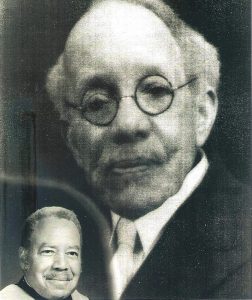New Digital Exhibit | Slavery, Reconstruction Recounted in African American Memoir - College of Charleston Libraries
The College of Charleston’s latest digital exhibit solves a nearly 90-year-old history mystery.
In 1929, a memoir was published under the pseudonym “Sam Aleckson.” Titled Before the War and After the Union, it chronicled the author’s life from his earliest memories of being enslaved in Charleston to his post-Reconstruction move to Vermont.
Save for family members, the author’s true identity remained a secret. Until now.
The author is Samuel Williams, a Charlestonian born in 1852. His life and work are featured in a new digital exhibit hosted by the College of Charleston’s Lowcountry Digital History Initiative: Samuel Williams and His World: Before the War and After the Union.
The exhibit weaves together Williams’ memoir and original archival research, tracing the author’s life as he experienced the upheavals of slavery, the Civil War, and relocating his family far from their Charleston roots.
“The story of Samuel Williams is uniquely American but also uniquely South Carolinian,” said Susanna Ashton, the exhibit’s author and professor and chair of English at Clemson University. “He left South Carolina and its tremendous memories of pain and suffering behind him when he moved north. But he held onto a lot of love for both black and white families he knew as well as a fierce affection for Charleston.”
“I was born in Charleston, South Carolina in the year, 1852. The place of my birth and the conditions under which I was born are matters over which, of course, I had no control. If I had, I should have altered the conditions, but I should not have changed the place; for it is a grand old city, and I have always felt proud of my citizenship.” – Samuel Williams, Before the War and After the Union
“He always remained a South Carolinian,” Ashton continued. “In a rather surprising and touching way his life—which spanned centuries, generations, and states—demonstrates how our nation is always entwined, and how none of us can afford to see ourselves as uninvolved or indifferent to one another.”
In addition to a narrative overview, interactive timeline, and plethora of primary sources, the exhibit features a rare portrait of Williams previously held in the private collection of his descendants.

Samuel Williams pictured with grandson, Walter G. McClain (lower left), circa 1940 and circa 1980 respectively, courtesy of the McClain family.
Samuel Williams and His World is produced and hosted by the Lowcountry Digital History Initiative (LDHI), the interpretive arm of the Lowcountry Digital Library (LCDL). Students Colby Causey and Ashley Hollinshead from the College of Charleston-Citadel Graduate History M.A. Program provided administrative and curatorial assistance for the exhibit.
“The exhibit on Samuel Williams touches on so any aspects of Charleston and Lowcountry history,” said Leah Worthington, Digital Projects Librarian at the College. “From plantation to urban slavery, and from slavery to freedom, the story of Samuel Williams provides a window into how major historical narratives were experiences by a single person.”
Samuel Williams and His World: Before the War and After the Union, along with nearly two dozen other digital exhibits, is available at http://ldhi.library.cofc.edu.
About the Lowcountry Digital History Initiative
The Lowcountry Digital History Initiative (LDHI) is a digital public history project hosted by the Lowcountry Digital Library at the College of Charleston. Funded through a pilot project grant from the Humanities Council of South Carolina and a major grant award from the Gaylord and Dorothy Donnelley Foundation, LDHI began development in 2013 and launched in 2014 as a digital consultation service, scholarly editorial resource, and online platform for partner institutions and scholars to collaborate in creating freely accessible digital public history exhibitions which focus on the Lowcountry region’s underrepresented history and culture.
About the Lowcountry Digital Library
The Lowcountry Digital Library (LCDL) produces digital collections and projects that support research about the Lowcountry region of South Carolina and historically interconnected sites in the Atlantic World. LCDL is committed to a multifaceted approach that incorporates historical and anthropological scholarship, oral history, integrative archival practices, digital librarianship, and spatial, temporal, and environmental information. Together with its institutional partners, LCDL helps students, scholars, and a wide range of public audiences develop a better understanding of the history and culture of the South Carolina Lowcountry relative to the nation and the world.
